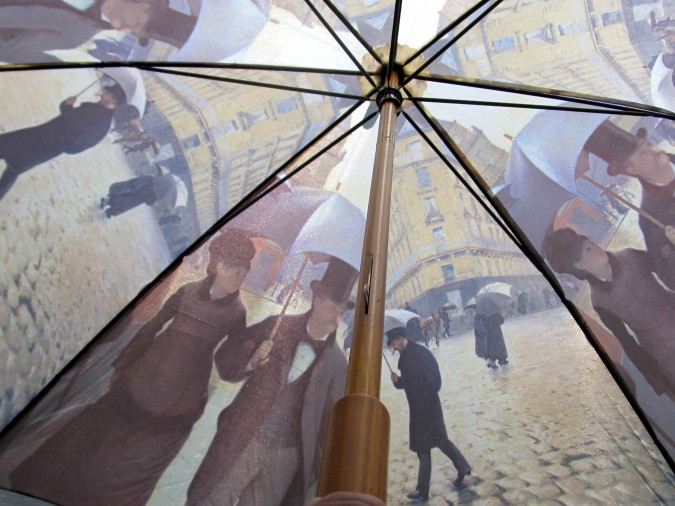LOS ANGELES (JTA) — What gifts do our mothers give us?
Not the kind we see in the mirror. Like me, you’ve probably already accounted for where your eye color, nose shape and eyebrows that seem too close to each other come from.
I’m talking inner gifts, those money can’t buy — our proclivities, opinions and even character traits, called middot in Hebrew.
One year on Mother’s Day, in an 11th-hour hunt for a gift at the Los Angeles County Museum of Art’s store, I found myself drawn to a beautiful umbrella printed with a design taken from a painting by the French Impressionist Gustave Caillebotte. But as I stood in the checkout line admiring my find, I wondered: Was I buying this for my mother or myself?
Yes, I’ve seen the articles about women who are horrified to suddenly realize that they have become their Jewish mother. But I was trying hard not to buy into that. Just because I loved Impressionist art didn’t mean I shared my mom’s taste. Well, maybe a little. OK, a lot. But even so, was that reason for panic?
One of the Ten Commandments does tells us to honor thy father and mother, I reasoned, and in Leviticus the order is reversed, if we needed a reminder of who comes first. Recognizing the things that our mothers have passed on to us I think is a way of honoring, as well as reckoning with, their influence.
For me, the gift list begins at the supermarket. Every time I go shopping, though she passed away a few years ago, my mother, Pearl, is with me. She was never a lover of packaged bread, and as I push the cart down the bakery aisle, it’s almost as if I hear her epithet for many of the products she found there — “vile” — coming from the PA system. Thus I usually frequent Jewish bakeries, where the sound I hear is more like kvelling.
It’s the same at department store sales. Even though she wasn’t particularly thrifty, when Mom found something she thought useful and stylish, the credit card came out. As a teenager, I vividly recall her reaction when she brought me before a sales rack of perfectly fine clothes but I couldn’t find anything to my taste. In total frustration she tossed several shirts and pants to the floor and walked away.
Today, to make amends, I find it difficult to pass up a sale and have a closet of tasteful yet somehow slightly off-color and oddly patterned apparel to show for it. And in what I believe to be a twist from the usual husband-wife arrangement, I’m the one exhorting my wife to buy things at a good sale. Why is it that she sometimes walks away?
Mom also comes with me to shul, where she was an unapologetic “shusher.” Woe to anyone talking in her vicinity.
As an adult I feel compelled to uphold my heritage. Not a shusher, I am more of the “fish eye” type or, if that is ignored, a “cold stare” guy. Let’s not even talk about my reaction to your cellphone going off.
In terms of middot, Rabbi Yisroel Salanter (Lipkin), the founder of the Musar movement — originated in 19th century Eastern Europe among the Lithuanian Orthodox, the movement was especially concerned with Jewish ethics — encouraged folks to work on attaining 13 of the traits. The list includes honor, patience and humility. Without being exposed to his teachings, Mom had me working on these three, as well as a few others.
Like Rabbi Salanter, tops on her list was “truth,” and she definitely was one to tell it like it is, especially if she thought you were falling short in some area or weren’t coming clean about something, like “What was that explosion I heard coming from your bedroom?” Consequently, she wasn’t surprised when I signed up for the high school newspaper and started writing editorials, even columns.
Mom was also big on two additional traits from the rabbi’s list: cleanliness and order. In her home, every room was dust free and every box labeled. She tried her best to mold me in her pattern, but apparently only influenced me to go in the opposite direction. Where she liked clear tabletops, I have stacks of books, papers and broken bibelots. Where she had drawers of neatly folded wrapping paper, boxes of note paper and thank-you cards, my tastes run more to stationery store in a twister.
Order for my mother included preparing dinner every night and having her family sit down to the Formica-topped table to enjoy it. The tasks of shopping, cooking and cleaning were more evenly divided in my household — my mother taught me how to cook.
Have I passed on any of these traits to the next generation, my own children? A few, I hope. But isn’t that what l’dor v’dor is all about?
As for the art-covered umbrella, I have it now. But that day, understanding the influences that had drawn me to it, I gave it to my mom. Every time I open it, the umbrella reminds me of her gifts.
(Edmon J. Rodman is a JTA columnist who writes on Jewish life from Los Angeles. Contact him at edmojace@gmail.com.)






